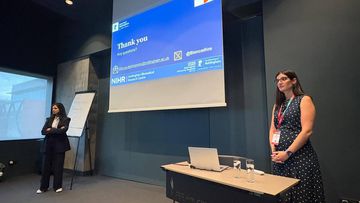Poster at ECTRIMS highlights data around socioeconomic status and health outcomes
KnowledgeA group of professionals saw their poster on socioeconomic data and health outcomes in multiple sclerosis (MS) published at ECTRIMS Congress 2021 last week entitled: 'Wellbeing Gap: One-Size MS Service Does Not Fit All.'
The collaboration across consultant neurologists, specialist nurses, the voluntary sector and industry set out to assess comorbidities, inpatient admissions, and their associated costs in patients with MS based on socioeconomic status and deprivation across 4 integrated care system (ICS) areas in England.
The group was formed to address 'data and evidence' within the Living well with MS workstream, part of the national programme, 'Raising the Bar for MS'.
Figure 2: Tweet from Helen Bodwen, living with PPMS via twitter.com/helenblodwen
Important data re. the correlation between socioeconomic status and health & well-being outcomes for people with #MS in the UK. How can statutory services and the voluntary sector work together to bridge the health gap? @OvercomingMS @TheNeuroAcademy @ectrimscongress https://t.co/9xxs6lH4na
— Helenblodwen (@helenblodwen) October 13, 2021
Examining data across four UK sites, they concluded that the long-recognised wellbeing gap in the UK may have been further exacerbated by the coronavirus pandemic, further highlighting the need for strong collaboration across health, social care and community providers.
They recommended strong clinical leadership and good engagement from the MS community and within integrated care systems (ICSs) as an important vehicle to change, making recommendations for ICSs around strategies for action on social determinants of health, early interventions to prevent health inequalities, and implementation of whole systems monitoring.
Additional recommendations around data use and population management were also made, with specific examples made within the MS community. These included specific focus on management of patients with MS who have three or more non-elective admissions each year, or numerous comorbidities, to prevent unnecessary admissions, improve health outcomes and reduce healthcare costs.
The poster received a good amount of comment and discussion, including on social media such as Twitter (fig 2, 3 and 4).
Figures 3 and 4: Twitterfeeds from healthcare consultant Sue Thomas and voluntary sector organisation Overcoming MS, regarding the poster at ECTRIMS.
We are really proud of our collaborative work with neurologists, MS Nurses and other partners on creating this poster for @ectrimscongress as part of the Healthy Lifestyle workstream at the MS Academy (@TheNeuroAcademy). pic.twitter.com/4XJTee1L6v
— Overcoming MS (@OvercomingMS) October 13, 2021
Our poster P144 Well being gap: one size MS service does not fit all @ectrimscongress #ECTRIMS2021 come and see us @GavinGiovannoni @DrWBRO @TheNeuroAcademy @AgneStraukiene @ruthstross @OvercomingMS @MSTrust @mssocietyuk pic.twitter.com/oeoW2aEj3e
— Sue Thomas (@Sue_NHiS) October 13, 2021
The full reference for the poster is:
Straukiene A, Stross R, Pomeroy I, Fisniku L, Berry G, Peel C, Chico D, McGowan C, Thomas S, 'Well-being Gap: One-Size MS Service Does Not Fit All'. 37th Congress of the European Committee for Treatment & Research in Multiple Sclerosis, October 13-15, 2021, p144
Related articles
Encouraging excellence, developing leaders, inspiring change
MS Academy was established in 2016 and in that time has accomplished a huge amount with exciting feedback demonstrating delegates feel inspired and energised along their personal and service development journeys. The various different levels of specialist MS training we offer are dedicated to case-based learning and practical application of cutting edge research.


